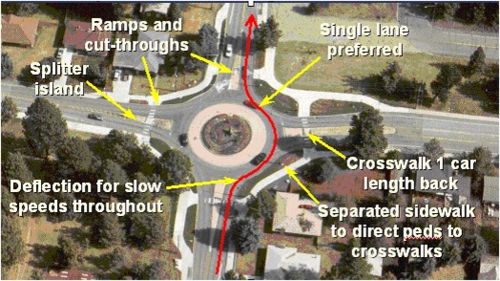Difference between revisions of "642.12 Pedestrians and Roundabouts"
Jump to navigation
Jump to search
(Expanded pedestrian guidance that includes ADA, per Design) |
m (minor clarification) |
||
| Line 13: | Line 13: | ||
* Set sidewalks back to guide users to the crosswalks. | * Set sidewalks back to guide users to the crosswalks. | ||
| − | For more information on roundabouts refer to [[233.3 Roundabouts|233.3 Roundabouts]]. | + | For more information on roundabouts refer to [[233.3 Roundabouts|EPG 233.3 Roundabouts]]. |
[[category:642 Pedestrian Facilities]] | [[category:642 Pedestrian Facilities]] | ||
Revision as of 07:15, 5 April 2010
Important roundabout design features for pedestrian safety and access are shown in Figure 642.5.
Most pedestrians can look for a gap and cross one leg at a time in single lane roundabouts. However, all roundabouts pose problems for visually impaired pedestrians because crosswalk locations are not apparent and circulating traffic masks the sound cues that visually impaired pedestrians use to analyze crossings.
Multi-lane roundabouts add multiple risks for all pedestrians to cross. Vehicles speeds are higher and gaps more infrequent. Possible solutions to improve access for pedestrians in roundabouts are:
- Provide audible or tactile cues to indicate crossing location.
- Provide good sight distances between pedestrians and motorists.
- Set sidewalks back to guide users to the crosswalks.
For more information on roundabouts refer to EPG 233.3 Roundabouts.
